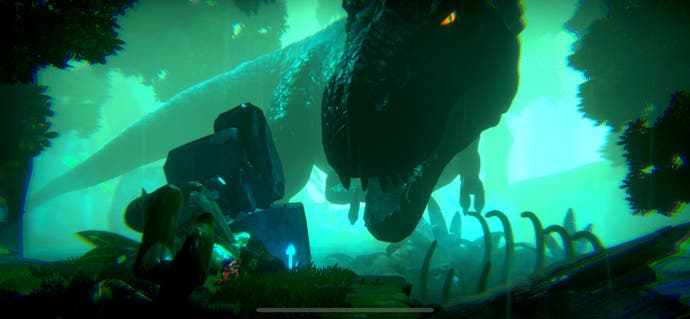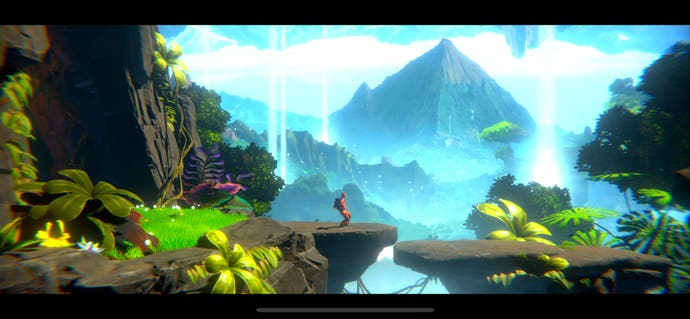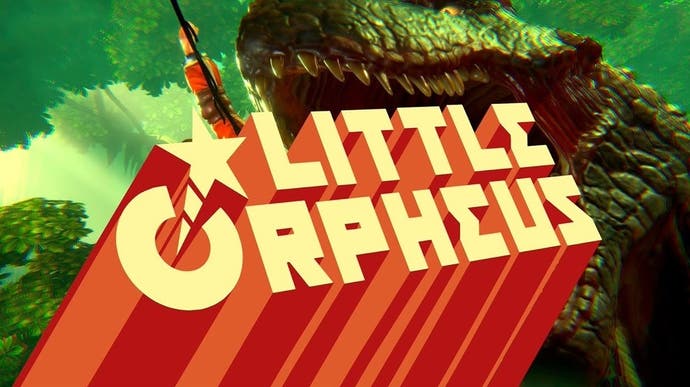Little Orpheus review - a delightful platforming sprint from the masters of the walking sim
Run, don't walk.
Before we begin: nope, Little Orpheus is not a walking simulator.
In recent years The Chinese Room has - quite unfairly, I reckon - been maligned for its "walking simulators", games that take you through gentle, if powerful, tales that unfold as you wander, as though a thoughtful game without guns and spurting arteries is somehow less worthy of your time and money. This patently isn't true - and that's coming from a shooter fan - but perhaps in acknowledgement of that criticism, the studio's latest endeavour breaks free of the moulds cast by the evocative Dear Esther and Everybody's Gone to the Rapture and instead takes you on a rip-roaring 60s adventure through a smorgasbord of bright, beguiling places.
And it's so well made, too. The visuals are delightful. The score is the perfect jaunty accompaniment. The voice acting is sublime, and the light, humorous narration that goes back and forth between our two characters is sprinkled liberally, but not overpoweringly, throughout the tale. Each chapter shares DNA, yes, but they take you to an exotic new location every time, a story stuffed with mystery and magic and dinosaurs and giant worms and technicolour walruses and magic helmets and Krakens lurking deep on the ocean floor. Every segment is an unmitigated delight to explore, and its pitch-perfect script is delivered by an impressive cast with gentle, light-hearted perfection. As he bumbles through Plutonia - a wild, impossible world sitting at the earth's core - our protagonist, Ivan Ivanovich, will shriek with nervous glee - or should that be gleeful nervousness? - as he lurches from one squeaky-bum moment to the next.

The world we explore comes courtesy of Ivanovich's retelling of where he's been for three years, entirely MIA. Despite failing his medical (and being caught cheating on his entrance exams; I kind of love him already), Ivanovich is a Soviet cosmonaut selected not for the space race, but for a trip heading in the opposite direction; the centre of the Earth. The story unfolds as Ivanovich is hauled before his General, the intense Yurkovoi, and forced to account for the three years he had... well, disappeared off the face of the earth, taking the priceless atomic bomb powering his exploration capsule with him.
Oh, it's a captivating yarn, and a glorious adventure to boot. That said, the ending didn't quite satisfy me. There were one too many sharp story pivots that didn't necessarily make sense of the characters I'd grown to know (and love). I can't deny that I enjoyed the journey, or the unexpected cameo of Laika, the first animal to orbit the Earth in Sputnik 2. The astounding visual performance is only enhanced further by a striking, perfectly balanced score that had me sitting through the repetitive credit sequences just so I could bask in the cheery wholesomeness of Little Orpheus' main theme.
Each chapter is a tourniquet-tight, "commute-friendly" thirty minutes (although that doesn't matter as much these days, does it?), which is, to be honest, just about right, and neatly truncated my sessions. The problem, however, is that it's just too bloody small.
It's marvellous to see a development team craft such a unique, bespoke tale exclusively for mobile. But distilling this gorgeous, bright, technicolour world to such a tiny screen is agonising, particularly as the iPhone;s real-estate is often blighted by your own big, fat fingers and a single digit can entirely conceal Ivanovich from view. Things are a tad better when playing on the iPad's larger display, but I spent the entire time wanting to witness the majesty of the towering backdrops and Ivanovich's animated face close up on a bigger screen.

The mechanics, too, felt a touch undone by the inelegance of screen-swiping. While for the most part, Little Orpheus' platforming is plenty forgiving and usually telegraphs well where you should next be headed, your fingers are no replacement for the precision of a controller or mouse/keyboard. It's less of a problem early game, but the frequent chase sequences - plus segments partway through chapters seven and eight that were particularly frustrating - requires a depth of field and accuracy that's ill-fitted to the iPhone.
The checkpoints are a little mean, too. Not prohibitively so - believe me, I've experienced worse - but the imprecise mechanics and tiny screen often lead to unforced errors. It's not fun to keep rehashing the same old ground, particularly if you're forced to relisten to Ivanovich and Yurkovoi exchange the same conversation once, twice - maybe even more times. But succumbing to death rarely feels unfair or unwarranted.
Interestingly, there's not much layered learning, though. The skills Ivanovich employs in chapter one - leaping from vine to vine, scrambling up platforms, shimmying up ropes, yanking heavy switches, grabbing and repositioning crates - aren't that dissimilar from chapter eight's obstacles. But while, admittedly, some ideas are recycled - for instance, you'll see the telltale glow of the Menk's searchlights several times throughout your journey - they don't outstay their welcome. Like the narration, they're not over-used in the game's four-ish hour run-time.
Towards the end, though, things get somewhat more complex. A glowing - and seemingly fatal - mist that swirls below your feet begins to rise, which requires you to platform against the clock - not an easy feat on mobile. It felt intuitive to rotate your finger to manipulate the wooden gears peppering the snowy cliffs of chapter four, but it turns out, you need only to hold your finger down, which went against my instincts. Pairs of spinning gears have to be aligned before you can jump through towards the end of the game, but it's oh-so-hard to see them properly with the perspective you're given. The same is true of the late-game swinging pendulums; with the forced 2D-perspective, they're just a tad too difficult to gauge.
Oh, but that time I disguised myself as a dinosaur egg and the music tip-toed along with me? Or the time I crept along the fleshy, springy inners of a gigantic whale avoiding stomach bile? I pushed over an ice block and it splashed into the frozen water, seesawing a Day-Glo walrus into the air. I stealthily crept past a terrifying T-Rex with big teeth and bad eyesight. Little Orpheus is crammed with stand-out moments like these, and despite its crude control scheme and occasional frustrations, it's a must for anyone looking for a portable yet substantive adventure packed with colour, charm, and delightful dollops of humour.



